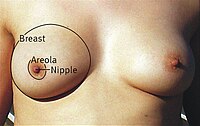
Photo from wikipedia
PURPOSE Breast cancer is the most common cancer type worldwide, with its survivors often experiencing physical and psychosocial health problems. Wearable device use is an innovative and effective way to… Click to show full abstract
PURPOSE Breast cancer is the most common cancer type worldwide, with its survivors often experiencing physical and psychosocial health problems. Wearable device use is an innovative and effective way to promote physical activity and improve health-related outcomes in breast cancer survivors; however, the current evidence is unclear. We aimed to determine the effects of wearable devices on physical activity and health-related outcomes in breast cancer survivors. METHODS PubMed, Embase, Web of Science, and Cochrane Library databases were searched to identify eligible studies from inception to September 2022. Additional relevant studies were obtained from the reference lists of the identified studies. Two reviewers independently screened the eligible studies, appraised the risk of bias, and extracted the data. Meta-analysis was conducted using Review Manager version 5.3. FINDINGS Sixteen randomized controlled trials were included. Physical activity tracking and pedometer-based interventions improved moderate-intensity physical activity (standardized mean difference [SMD] = 0.32, 95% confidence interval [CI]: 0.17-0.46, p < 0.0001), moderate-to-vigorous physical activity (SMD = 0.85, 95%CI: 0.38-1.32, p = 0.0004), total physical activity (SMD = 0.51, 95%CI: 0.12-0.90, p = 0.01), quality of life (SMD = 0.17, 95%CI: 0.03-0.31, p = 0.01), physical function (SMD = 0.21, 95%CI: 0.04-0.38, p = 0.02), and mood state profiles (SMD = -0.58, 95%CI: -1.13 to 0.02, p = 0.04) in breast cancer survivors. However, the effects of low-intensity physical activity, vigorous-intensity physical activity, fatigue, anxiety, depression, and sleep quality could not be ascertained. CONCLUSIONS Physical activity tracking and pedometer-based interventions were effective in increasing physical activity and improving health-related outcomes in breast cancer survivors. IMPLICATIONS FOR NURSING PRACTICE This review offers availability of credible evidence supporting the potential usefulness and effectiveness of wearable physical activity trackers on physical activity and health-related outcomes in breast cancer survivors.
Journal Title: International journal of nursing knowledge
Year Published: 2023
Link to full text (if available)
Share on Social Media: Sign Up to like & get
recommendations!